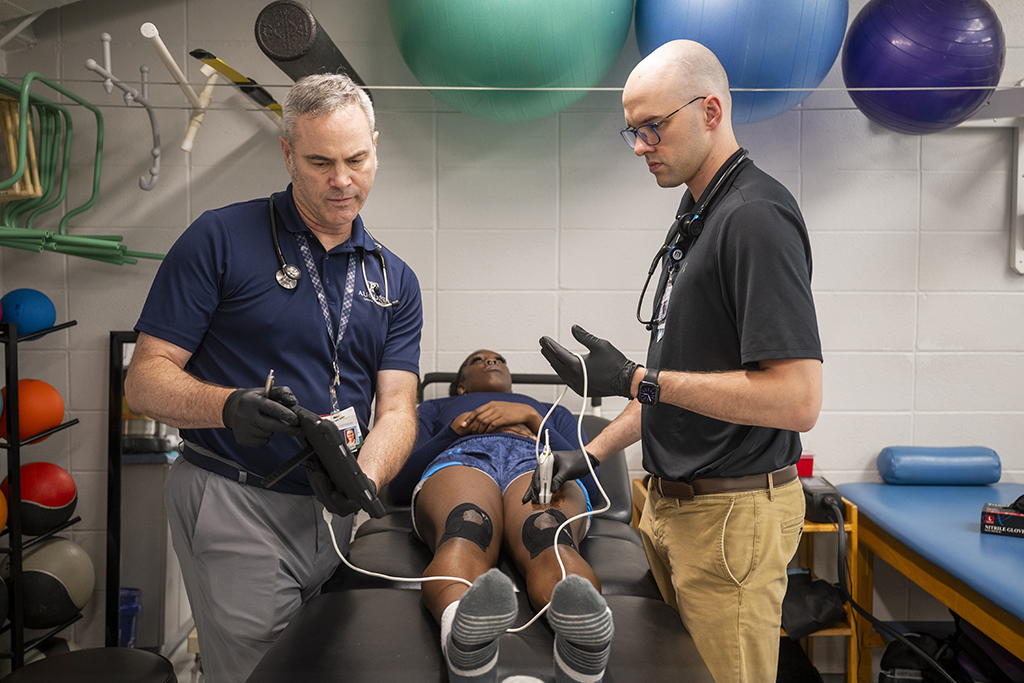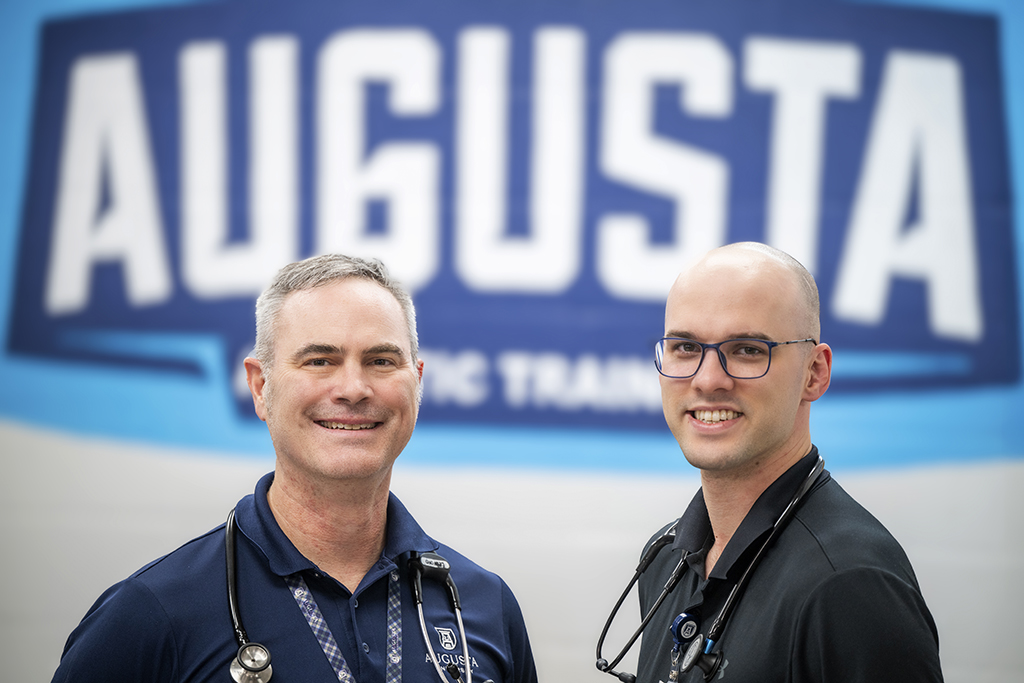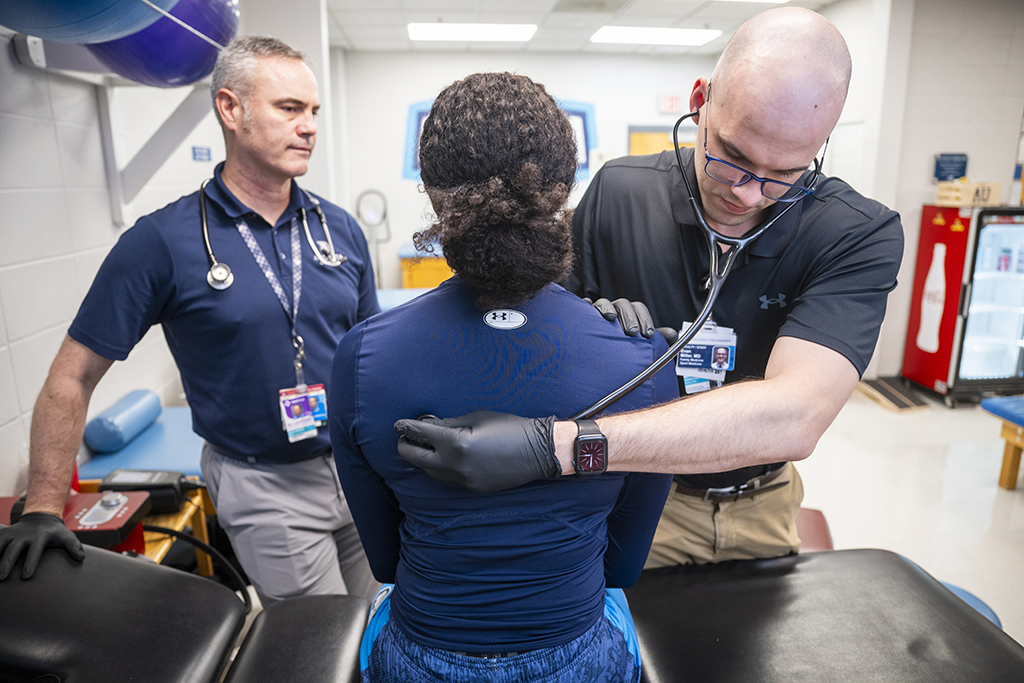The Department of Family and Community Medicine at the Medical College of Georgia at Augusta University has been building a sports medicine presence over the past four years, according to Dean Seehusen, MD.
As chair of the department, Seehusen hired Chris Ledford, MD, four years ago, appointing him as the department’s first sports medicine physician in almost a decade. Since then, Ledford has worked to establish a primary care sports medicine division and a Sports Medicine Fellowship. He began by acquiring accreditation for the fellowship from the Accreditation Council for Graduate Medical Education.
The division has also expanded to include the Primary Care Sports Medicine Fellowship, becoming the only public medical school in Georgia to offer the program. The goal is to boost training in sports and exercise medicine for primary care physicians to serve patients more comprehensively.
“It’s important that this institution has a division of sports medicine because it really plants a flag that we are the regional expert in sports medicine care.”
Dean Seehusen, MD, chair of the Department of Family and Community Medicine at MCG
In July 2023, one-third of Georgia counties had an orthopedic surgeon available, while two-thirds did not have a physician or provider with musculoskeletal-specific training to evaluate and treat certain injuries.
“Oftentimes, patients have to drive two or three counties away in order to receive any kind of orthopedic care. In preparing physicians who can do both primary care and provide specialty care in terms of primary care sports medicine, we hope we’ll work on fulfilling that need,” said Ledford, who is the director of the Sports Medicine Division. “We are shared between our home department and the Department of Orthopaedic Surgery, and we serve to be the focal point for primary care sports medicine between the athlete, the athletic trainer and the medical system.”
The fellowship accepts one fellow per academic year and offers a 12-month accredited fellowship to physicians who have completed an ACGME-accredited residency in family medicine, emergency medicine, internal medicine or pediatrics. Upon completion of the fellowship program, graduates are eligible for the Certificate of Added Qualification or Sub-specialty Certification in Primary Care Sports Medicine from their primary specialty board.

Some of the experiences the fellows will encounter include assisting with Augusta University’s Athletics training staff, serving as the team physician for several Richmond County high schools for athletic event coverage including football sideline and injury clinics throughout the school year, taking part in ultrasound opportunities for diagnostic and therapeutic purposes, assisting with the IRONMAN 70.3 Augusta and USA Cycling Collegiate Road National Championship events by staffing their medical tent, and partnering with the emergency department event medicine team at local golf tournaments to provide medical coverage for attendees.
Seehusen anticipates an increase of two fellows since the demand for musculoskeletal-trained physicians continues to be high. They have already graduated three classes, and the new fellow started in July. Seehusen and Ledford recognize the importance of housing this fellowship with MCG’s Family and Community Medicine as they move forward.
“If you think about the age range where musculoskeletal injuries occur, sports injuries or non-sports injuries, it is from toddlers through geriatrics. So, to have somebody who can feel comfortable taking care of all those age ranges is ideal,” Seehusen said. “It’s important that this institution has a division of sports medicine because it really plants a flag that we are the regional expert in sports medicine care.”
Ledford said the fellows’ training helps them achieve the knowledge needed for their job while also allowing the student-athletes to have peace of mind about their individual care.
“They’re being treated by physicians who remember that they are student-athletes. They are students first, and we want to optimize, improve and return them to classroom performance before they return to athletic performance, but to have a physician that understands the stresses they have on their body and on their mind in athletic competition and in the college classroom, it’s beneficial,” Ledford said.

Seehusen said having someone like Ledford in the position benefits MCG, its students and the community.
“The education in musculoskeletal medicine has taken a huge leap forward, and if you think about the number of patients in primary care who have some sort of musculoskeletal complaint – knee, shoulder or low back pain – that’s one of the most common things that people come in to see a primary care physician,” Seehusen said. “We are now giving people a high level of education in those non-surgical orthopedic injuries. We’ve expanded the education for both medical students and primary care residents in this area that they’re going to see every day for the rest of their careers.”


Leave a Reply
You must be logged in to post a comment.